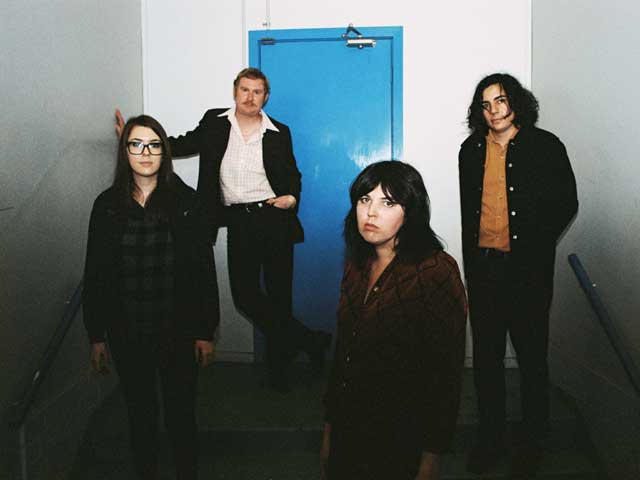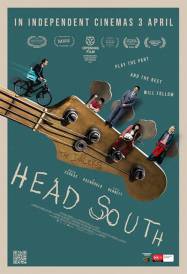RVG Feral Interview

RVG Return With Their Highly-Anticipated Second Album, Feral
Following their beloved 2017 debut A Quality of Mercy, RVG perform the tricky alchemy of combining rock's urgency, punk's anarchy, and pop's empathy to create a record that feels vital: Feral is a catharsis, a call to arms, and a forthright indictment of contemporary complacency. To Romy Vager, RVG's lead singer and lyricist, to feel feral is to feel outside of everything. Throughout this album that feeling of isolation is incited, but it never feels hopeless: these songs channel the raw energy of despair and frustration into melodies that often feel victorious, perhaps only because they so aptly supply a soundtrack to the end of days.
Feral was recorded at Head Gap studios with producer Victor Van Vugt (PJ Harvey, Nick Cave & The Bad Seeds, Beth Orton). Internationally renowned, Van Vugt currently resides in Berlin, Germany and travelled to Melbourne to work with RVG. One of the producer's key tenets is a sense of spontaneity, of capturing the essence of a song's live performance, a concern that RVG prize above all else when recording. The band recorded the album's instrumentals live to track, allowing their playing to be infused with the kind of electricity that has seen the band's live show lauded across Australia and internationally. Guitarist Reuben Bloxham plays with an emphatic precision, but his guitars often feel as alive as Vager's voice, while drummer Marc Nolte steers the album, at turns restrained and freewheeling.
Feral's lead single "Alexandra" was released in May 2019, described by The Fader as "maintain[ing] the band's raw energy while adding newfound depth and sheen...Vager's evocative howl underscored by instrumentation that's powerful without overpowering." A song that describes the pain of the ever-entwined personal and political, "Alexandra" is at home on Feral: Vager's lyrics are concerned, as ever, with the state of the world around her. That said, these are not laments or elegies. Instead, the songs on Feral often feel like exorcisms. "Help Somebody", written on a pivotal day in global politics, isn't only helpless, but describes the need to do something good, to help without necessarily knowing how.
Vager isn't afraid to inhabit voices other than her own as a way of thinking through the world around her. The titular character on "Christian Neurosurgeon" is an emblem for the kind of cognitive dissonance that allows for the constant preferencing of individual beliefs over collective action, as Vager cackles and the sound of a surgeon's drill blares. "Little Sharky" is Vager's ode to a friend she made at seventeen: on the song she takes on his voice, aiming to immortalise and actualise her friend's casual assertions that he spoke regularly to dead celebrities and that he helmed a successful band. On "Asteroid", the philosopher Ludwig Wittgenstein is forced by a friend's casual gesture to reassess his life's work, as Vager considers the ways in which an outside influence can interrupt everything. Then comes "I Used to Love You" a goodbye that's devastating in its simplicity, where the band exist at their most potent and powerful.
Feral is RVG's first full-length release in three years, and marks the beginning of an exhilarating new era for the band. Both a cry for help and a call to action, this is an album that demands your attention.
RVG is Romy Vager, Reuben Bloxham and Marc Nolte.
Interview with Romy Vager
Question: Can you tell us about Feral?
Romy Vager: Feral is our brand new second album.
Question: What inspired the album?
Romy Vager: Lots of things: captain snooze, depression, neurosurgery and heartbreak.
Question: Is there a particular message you hope listeners take from your music?
Romy Vager: I guess this album is about weirdos and their feelings; I guess I'd hope that people would look out for the weirdos a bit more.
Question: What was it like recording at Head Gap studios?
Romy Vager: It was great, it's a very nice studio and it was fun to do stuff a bit more pro this time around.
Question: How did working with Victor Van Vugt come about?
Romy Vager: He happened to be in the country and we talked him to staying a bit longer, I knew I really wanted to work with him when I found out he engineered that PJ Harvey record.
Question: How have artists like PJ Harvey and Nick Cave & The Bad Seeds influenced your music?
Romy Vager: I love PJ Harvey; that 'Stories From The City, Stories From The Sea' album is one of my favourites.
Question: Do you prefer performing live or recording?
Question: Which is your favourite song to perform live and why?
Romy Vager: I like the slower ones at the moment, stuff that I can really get into.
Question: How did the band come together?
Romy Vager: We sort of fell in together when I needed some people to play a gig that my friend booked for me; everybody said yes and it's kept going from there.
Question: What motivates you most when writing music?
Romy Vager: I'm not really sure, everything just sort of happens by accident. I guess when I'm in a good place and can sort of believe in myself for 45 minutes is when it happens.
Question: Which music/artists are you currently listening to?
Romy Vager: I'm listening to a lot of Cat Stevens and 50s music right now.
Romy Vager: I'd like to work with someone who was the complete opposite of me, someone like Bjork or Billie Eillish or someone; someone who could take my songs and turn them into something that I couldn't possibly imagine doing myself.
Question: What's next, for you?
Romy Vager: I'm not sure yet, the COVID-19 crisis has paused everything for now, I guess I'm just writing as much as I can, figuring out what the next thing will look like.
Interview by Brooke Hunter
Photo: Anna Cunningham
MORE



